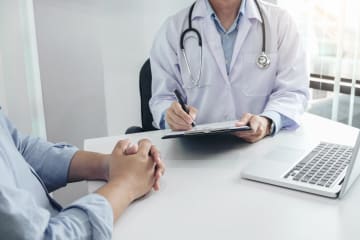
What is an opioid overdose?
Opioids are strong pain medicines. Examples include hydrocodone, oxycodone, fentanyl, and morphine. Heroin is an example of an illegal opioid. Taking too much of any opioid is called an overdose. When this happens, you get very sleepy. Your breathing slows down or stops. This can cause death.
Who is most at risk?
Your risk goes up if you misuse opioids, take high doses, or have overdosed before. Certain health problems put you at higher risk too. You're also at higher risk if you use opioids with another substance, like alcohol. And your risk is higher if you start using opioids again after you'd cut back or stopped.
How can you reduce your risk?
Opioids can cause serious problems if you misuse them. They can even cause death. But there are things you can do to help keep yourself safe.
- Take medicine only as prescribed.
Follow all dose instructions. Never share your medicines with others.
- Do not combine opioids with alcohol or other medicines.
Opioids can be dangerous if you take them with alcohol or with certain medicines. These medicines include sleeping pills, muscle relaxers, and other medicines that can slow breathing. Tell your doctor about all the medicines you take. Don't start any new medicines before you talk to your doctor or pharmacist.
- Follow your pain management plan.
Your plan will include other options to help with pain. They can help lower the amount of an opioid you need. If you don't have a plan, talk with your doctor. You can make one together.
- If you have reduced or stopped an opioid, don't return to your old dose.
Your body gets used to taking less (or none) of this type of drug. If you suddenly return to taking the same amount that you did before, you are at a higher risk for overdose.
- Ask your doctor about a naloxone rescue kit.
Naloxone is used to treat an opioid overdose. It can help save the life of someone who has overdosed. Know the signs of an overdose. Make sure that you and the people close to you know how to use the kit.
- Take steps to keep others safe too.
Store opioids in a safe and secure place. Make sure that pets, children, friends, and family can't get to them. When you're done using them, get rid of them safely. You can use a local drug take-back program or a mail-back program. If one of these programs isn't available, you can flush skin patches and pills down the toilet.
- Talk to your doctor if you're worried about your safety.
If you are worried about your safety while taking opioids, or if you're misusing them or taking illegal opioids, talk to your doctor. Your doctor can help you take steps to stay safe. Your doctor can also connect you to resources to help you stop using opioids.
Where can you learn more?
Go to http://www.healthwise.net/patientEd
Enter R355 in the search box to learn more about "Learning About Reducing Your Risk of Opioid Overdose".
Current as of: August 20, 2024
Author: Ignite Healthwise, LLC Staff
Clinical Review Board
All Ignite Healthwise, LLC education is reviewed by a team that includes physicians, nurses, advanced practitioners, registered dieticians, and other healthcare professionals.

